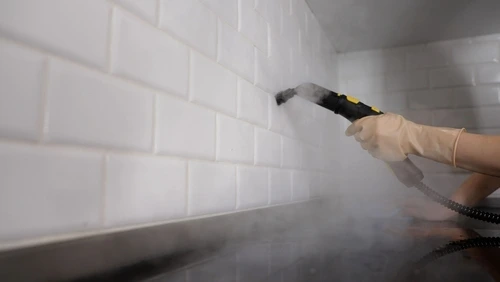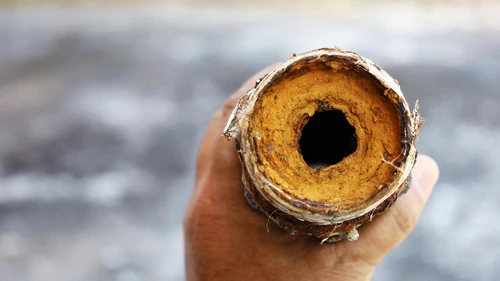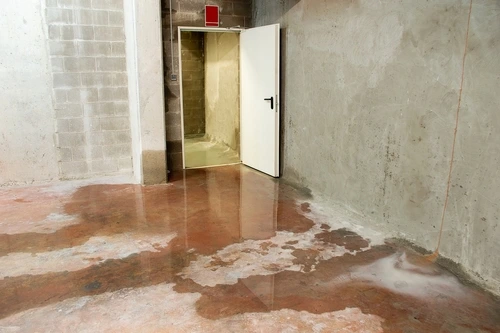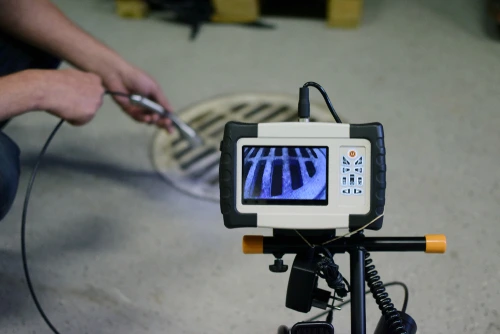
|
Tile grout dust hardens like concrete inside drains and drain tiles, creating clogs that strain sump pumps and risk basement flooding. Flush immediately with hot water, but for lasting protection of your basement drainage system, contact your local Mr. Rooter Plumbing® service professional. |
Mr. Rooter Plumbing® experts explain how tile grout dust affects drains.
|
Tiling projects often result in grout dust being washed down the drain. The problem? That dust hardens like concrete, causing clogged drain tile that can affect your entire interior drainage system. Left alone, the blockage can lead to slow drains, backups, or basement water damage.
In this guide, we’ll explain how grout dust affects your drains, the warning signs to watch for, and the best ways to protect your basement drainage system.
What Is an Interior Drainage System?
Your interior drainage system is the safety net that keeps your basement dry. It usually includes drain tile (perforated piping that runs along the inside edge of your basement floor) and a sump pump that collects the water and pumps it away from your home. Together, they manage groundwater and protect your foundation from moisture and water damage.
Most homeowners don’t think about this system until there’s a problem. But when the drain tile gets blocked, whether by sediment, grout dust, or other debris, water has nowhere to go. And that’s when you start to notice slow floor drains, damp spots, or a sump pump that seems to run nonstop.
Your interior drainage system protects some of your home’s most important features: your foundation, basement floor drains, and sump pump. Clogged drain tile causes extra stress on your sump pump and a higher risk of basement flooding.
If you’ve noticed water lingering near your basement drain tile, it's time to check for a possible blockage before the problem escalates.
How Tile Grout Dust Creates Clogged Drains

When grout dust goes down a drain, it doesn’t simply wash away: It sinks, settles, and sets like stone. Those fine particles cling to pipe walls, narrowing the passage and restricting water flow. Over time, what looks like harmless rinse water can create serious drain tile blockages.
That’s when the chain reaction starts. As water backs up, drains around the house run slower, your sump pump has to cycle more often, and your interior drainage system loses efficiency and flow.
Soon, what began as a simple cleanup after a tiling project can escalate into clogged drain tile, causing sump pump strain and potential basement flooding.
Learning to recognize the indicators that your drainage system is struggling with grout-related buildup is the key to catching the problem early.
Signs of a Grout-Related Drain Problem

Grout dust clogs rarely cause immediate chaos. At first, everything may seem fine, but over time, the system will begin showing signs of struggle. Here are a few warning signs to watch for:
- Slow floor drains: Water that lingers or drains sluggishly may point to partial blockages in the drain tile.
- Sump pump cycling constantly: If your sump pump seems to run nonstop, it could be compensating for clogged lines.
- Water pooling near basement drains: A clear warning that water isn’t moving freely through your interior drainage system.
- Musty odors or damp spots: Extra moisture trapped in the basement can signal that the system isn’t keeping up.
- Sediment or grit in the sump pit: Particles that look like sand or sludge may be grout dust making its way into the pump.
|
Mr. Rooter Plumbing® Tip: If water begins backing up quickly, your home’s main water shut-off valve can buy you precious time and prevent damage until help arrives. Here’s a guide on how to find your water shut-off valve. |
If you’ve spotted these early warning signs of clogged drain tiles, the following DIY remedies may help prevent the situation from escalating.
What You Can Try Before Calling a Plumber
If you’ve spotted early signs of a clog, there are a few safe steps you can try at home:
- Flush with hot water: This helps keep tile grout dust from settling and hardening in the line.
- Plunge gently: A few plunges may clear light surface blockage in a floor drain.
- Check the P-trap: If you rinsed grout in a utility sink, remove and rinse the trap to clear out grit.
- Use a hand auger: A light pass with a hand auger may help dislodge minor buildup, but use caution to avoid pushing debris deeper into the drain tile.
- Scoop the sump basin: Clearing visible sediment can reduce extra strain on your sump pump.
|
Mr. Rooter Tip: Skip chemical drain cleaners. They won’t dissolve grout and can damage your plumbing. |
Why DIY fixes rarely last
While DIY clog removal can temporarily alleviate drain strain, these methods only offer short-term relief. Grout dust can harden like concrete once it settles in the drain tile or interior drainage system. Home methods might nudge a minor clog, but they can’t break apart hardened material lodged farther down the line. Professional drain cleaning is usually needed for a permanent solution.
How Professionals Solve Grout-Clogged Drains

Once grout dust hardens deep inside your drain tile or interior drainage system, plungers and hand augers can’t help. Plumbing professionals use specialized equipment and training to clear grout safely and restore your system without risking further damage.
Here’s what the process often looks like:
- Video inspection: A waterproof camera locates the grout or sediment clog inside the pipe or drain tile.
- Hydro-jetting: High-pressure water jets scour the pipes, breaking apart hardened grout dust and flushing it away completely.
- Drain cleaning machines: Specialized tools cut through stubborn buildup without harming PVC, clay, or metal pipes.
- System check: After the clog is cleared, the sump pump and floor drains are tested to ensure your entire drainage system is running smoothly.
Why professional drain cleaning matters
Grout clogs aren’t just annoying; they can strain your sump pump, trigger repeated backups, and even put your basement at risk of flooding. Professional service clears the problem at its source and helps protect your home’s foundation.
If you’ve noticed consistently slow drains, water pooling around your basement floor drain, or a sump pump that runs constantly, schedule a professional drain repair or replacement. Acting early can help prevent long-term damage while allowing your interior drainage system to work as it should.
How to Prevent Tile Grout Dust from Clogging Your Drains
The best way to deal with grout clogs is to stop them before they start. A few simple habits can keep grout dust from hardening in your pipes, protecting your interior drainage system for the long run:
- Contain construction debris: Never rinse tiling buckets or tools in sinks, tubs, or floor drains. Even small amounts of grout dust can harden and create a clogged drain tile.
- Use drain strainers: A strainer in sinks, showers, and basement floor drains helps block grout flakes and sediment before they enter your plumbing.
- Flush with hot water: After home projects or heavy drain use, run hot water to carry away fine particles before they settle.
- Cover basement drains: When working near a basement floor drain connected to your drain tile and sump pump, use a cover or cloth to keep grout dust out.
- Schedule inspections: Routine plumbing checkups and video inspections help confirm that your sump pump and any drain tiles around the house are clear and working properly.
Prevention is always easier than cleanup, but if you’re already facing water damage, here’s how to safely clean a flooded basement before repairs begin.
Protect Your Drains with Professional Help

Protecting your drains now means fewer plumbing emergencies later. Grout clogs won’t dissolve on their own, and once hardened, they can block flow, strain your sump pump, and cause a clogged drain tile that puts your basement or foundation at risk.
Your local Mr. Rooter Plumbing team can help with services tailored to your home. Our experienced service professionals can:
- Clear grout buildup from your interior drainage system,
- Inspect and repair drain tiles and sump pumps,
- Restore reliable flow with expert drain repair and replacement,
- Resolve basement floor drain backups before they lead to flooding,
- And much more!
Don’t wait for grout dust to turn into concrete in your pipes. Contact your local Mr. Rooter Plumbing today or request an estimate to stop grout clogs before they stop you.
This article is intended for general informational purposes only and may not be applicable to every situation. You are responsible for determining the proper course of action for your home and property. Mr. Rooter Plumbing is not responsible for any damages that occur as a result of this blog content or your actions. For the most accurate guidance, contact your local Mr. Rooter Plumbing location for a comprehensive, on-site assessment.
FAQs About Tile Grout Dust & Clogged Drains
Mr. Rooter Plumbing is a one-stop solution for all your plumbing service needs. Whether you need a pipe repaired, clogs cleared, or drains cleaned, you can count on our experienced team to get the job done right! Our commitment to exceptional service includes answering your questions. Here are answers to some of your most frequently asked questions about tile grout dust and clogged drains.
What happens if grout dust goes down a drain?
Grout dust doesn’t dissolve in water. Once rinsed into a drain, it settles and hardens like concrete inside pipes or drain tiles around the house. This creates clogged drain tiles, slows your interior drainage system, and can strain your sump pump, increasing the risk of basement flooding.
What are the signs of a grout dust clog in my drains?
Watch for gurgling pipes, water pooling near your basement floor drain, or a sump pump that won’t stop running.
These issues often indicate that grout buildup is blocking the drain tiles around the house. If you’re unsure, a professional drain inspection can pinpoint the problem.
Can I fix a grout-clogged drain myself?
Surface-level clogs may respond to plunging or a hot water flush. But grout deep in drain tiles for sump pump systems usually requires professional equipment. DIY methods rarely provide a long-term solution to the problem.
Can I use chemical drain cleaners for grout dust clogs?
No. Chemical drain cleaners can damage your plumbing, but they won’t dissolve hardened grout.
Professional drain cleaning methods, such as hydro jetting, are needed to safely and effectively clear hardened grout dust clogs.
How do I prevent grout dust from clogging my drains?
Avoid rinsing grout buckets or tools in sinks or basement drains, use strainers to catch particles, and cover basement drains during remodeling.
Professional plumbing inspections help ensure your interior drainage system, drain tile, and sump pump remain clear.
Can grout dust damage my sump pump system?
Grout buildup forces your sump pump to work harder, reducing its lifespan and increasing the chance of basement backups. Protecting your drain tiles around the house is essential for preventing costly repairs.
If you’re not familiar with how the sump pump protects your basement, here’s a quick guide on what a sump pump is and how it works
Can grout dust cause a basement floor drain to back up?
Yes. When grout dust hardens in the drain tile connected to the basement floor drains, water can’t move freely. This often leads to backups, pooling water, or even basement flooding if left unresolved.
If you notice these warning signs, schedule a basement drain repair promptly to prevent water damage from spreading.
What long-term damage can grout clogs cause?
Hardened grout inside drain tiles can add stress to your sump pump, potentially cracking pipes, weakening your interior drainage system, and increasing the risk of foundation water damage. Repairs may become more expensive the longer the issue is left untreated.
How much does it cost to unclog grout dust from a drain?
The cost to remove grout dust from a drain or interior drainage system varies depending on the location and severity of the clog.
Minor surface clogs may be resolvable for the cost of a few simple tools, such as a plunger or hand auger. Hardened grout in a drain tile or sump pump system usually requires professional hydro-jetting or drain repair. For the most accurate estimate and upfront pricing, contact your local Mr. Rooter team.
When should I call a plumber for a grout clog?
If your drains run slowly, your sump pump runs nonstop, or water backs up in the basement, it’s time to call a professional.
Qualified plumbers, such as Mr. Rooter Plumbing, can clear clogged drain tiles around the house, repair interior drainage systems, and protect your foundation from water damage.

